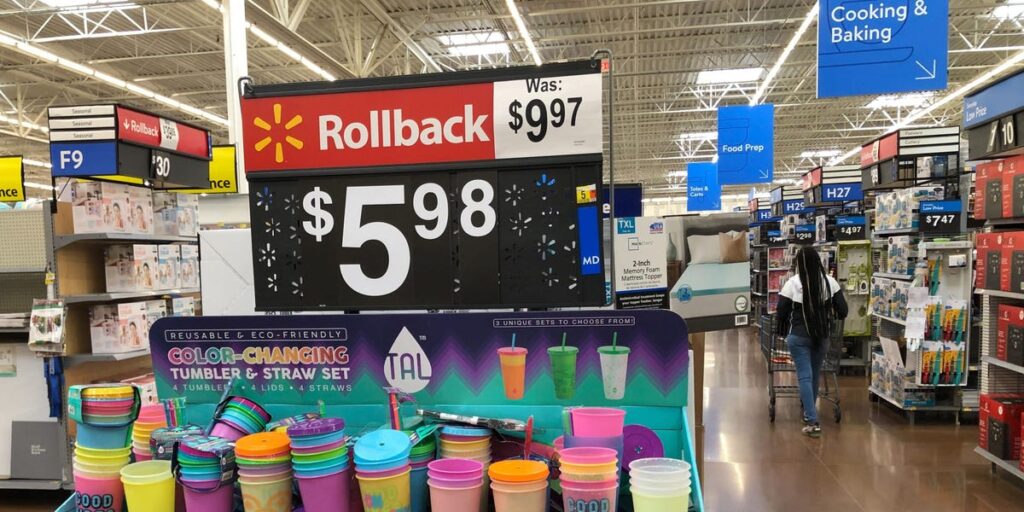By nearly every measure, the war on inflation is over.
While corporate profit-making pushed up prices, some of America’s largest retailers have been instrumental in arresting the seemingly endless upward march of grocery bills.
Look no further than Walmart, which has been aggressively cutting prices on items ranging from groceries to general merchandise and was one of the first to signal deflation in its aisles.
Earlier this summer, the retail giant said it had ratcheted up the fight with promotions on nearly 7,000 items, up 45% over the prior year.
CEO Doug McMillon says the number of “rollbacks” has topped 7,200, with more room to run.
“It is great to see prices come down,” he said during the company’s second-quarter earnings call. “We are wired to help bring prices down, and we’ll continue working to get more rollbacks to help customers and help members save money.”
Fitch Ratings Senior Director David Silverman called the accelerating rollbacks “a clear signal that consumer price inflation is moderating” in a note on the results.
Like many large retailers, Walmart sells a mix of national brand items — Pepsi sodas and Colgate toothpaste, for example — and in-house “private label” goods (Great Value, Equate, and, most recently, Bettergoods).
Prices in the grocery aisle have seen the biggest jumps in the former, as consumer packaged goods companies admit they have been making hefty profits during the inflationary environment.
The latter is where Walmart has the most flexibility to bring down prices more quickly, which it has been doing. It even spawned the notion of “value hacking,” or combining national brand and private label products in a shopping basket to save money, like splurging on Rao’s marinara to go on Great Value spaghetti.
According to consumer analytics firm Numerator, Walmart’s private label pricing has proven so effective that the sales from store brand goods have climbed to 30% of overall sales. That’s not far behind Costco and Sam’s Club.
The low-price strategy has also helped Walmart attract new customers from across all income brackets — market share gains buoyed the company’s sales performance in recent quarters as other retail brands have slowed.
But McMillon said Walmart has no interest in becoming more like private label powerhouses Trader Joe’s or Aldi: “We want to sell brands. It’s important to Walmart to sell brands and show a value.”
“We’re hoping that our branded suppliers do the right things with both quality and price to get to the value that our customers want to see,” he added.
In other words, Walmart wants to see the national brands’ pricing catch up to its in-house brand pricing.
“Those price gaps are wider than I think we’ve seen in a very long time,” Jefferies retail analyst Corey Tarlowe told Insider.
The main way that happens is through vendor-funded promotions, whereby national brands negotiate discounts on their products that Walmart can pass along to its shoppers.
Between the sizable profits in recent years and the popularity of private labels, Tarlowe said national brands have plenty of room (and incentive) to work with Walmart to offer better deals for customers.
“There’s tens of thousands of items in a Walmart store, so seeing rollbacks on 7,200 is still a relatively good number,” he added, “You’ll see it creep higher, but as far as how much? We’ll see.”
Read the full article here


